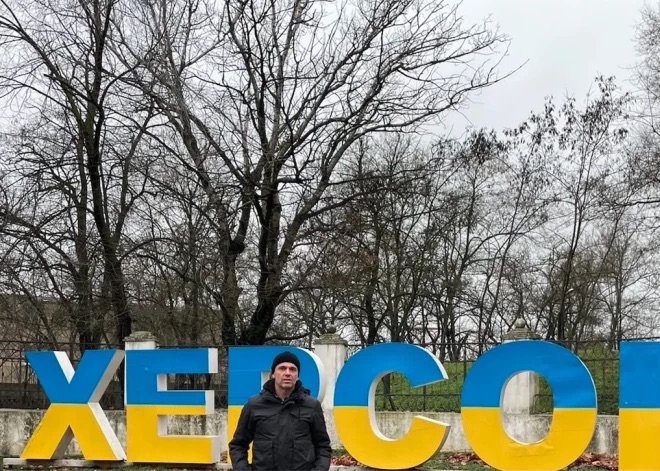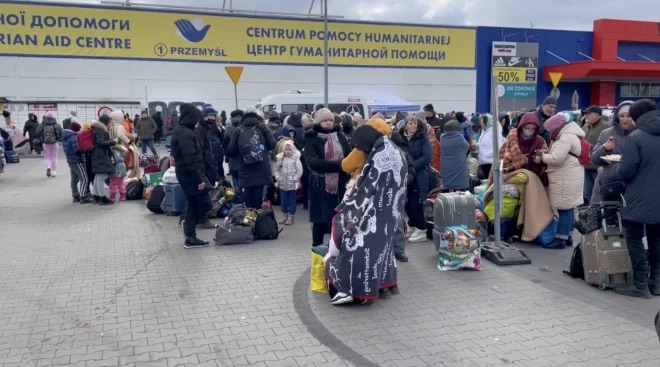
A humanitarian worker provides a unique insight into the war in Ukraine. "Thousands of Ukrainian refugees were kidnapped in Europe!"
Gundega Grīva
Jauns.lv
Jauns.lv
Since the beginning of the war launched by Russia, French psychologist and analyst Patrick Fors has spent a total of 12 months in Ukraine, including four months in the hottest frontline zones: Zaporizhzhia, Kharkiv, Kramatorsk, and Kherson. During this time, he provided humanitarian aid to local residents, co-founded the charity organization “Morkod,” experienced the brutality of war firsthand, and was part of several investigative teams, including those working on cases of kidnapped Ukrainian children.
The humanitarian worker offers a unique insight into the war...
The humanitarian worker offers a unique insight into the war...
When Russia invaded Ukraine on February 24, 2022, the country faced a humanitarian crisis. To address it, Ukraine engaged professionals from various countries worldwide to help deliver food and water to residents in war-affected regions, as well as to supply hospitals with vital medical supplies.
One such professional is Patrick Faure—a French humanitarian worker, psychologist, and analyst who lectures at the University of Geneva’s Department of Humanitarian Aid. He specializes in providing humanitarian assistance and analyzing disinformation methodologies, primarily in conflict and war-affected areas.
"I first arrived in Ukraine on March 3, 2022. At that time, the Russian army was attacking Mariupol and other major Ukrainian cities, as well as advancing toward Kyiv, striking Antonov Airport. Nowhere was truly safe—danger was everywhere, and it was unclear how the situation would develop," Faure revealed to Jauns.lv.
While more than four million people fled war-torn Ukraine, Patrick went in the opposite direction. When asked if he felt fear at that moment, the psychologist responded negatively.
"You feel fear before entering a conflict zone—at the moment you cross the border, it disappears. You become like a Swiss Army knife because you are active and feel useful," he explains.
"You feel fear before entering a conflict zone—at the moment you cross the border, it disappears. You become like a Swiss Army knife because you are active and feel useful," he explains.
Many Ukrainians lost their lives in their cars while trying to cross the border.
In the first month of the war, chaos reigned in Ukraine. More than 7.1 million people were displaced from their homes, while over 4.1 million fled the country, putting immense pressure on Ukraine's external borders. When Patrick Faure arrived in Ukraine, there was a 26-kilometer-long line of cars at the Ukraine-Poland border.
"During a 24-hour period, the border moved forward by about six kilometers. At that time, there was a large number of employees from the Russian Federal Security Service (FSB) in Ukraine, for whom this was an easy way to enter Europe. Therefore, the absolute priority of the Ukrainian and Polish border control representatives was to monitor this route and conduct the necessary checks. However, as a result, many people had to wait in their cars for at least four days to cross the Ukrainian border," Faure explains.
"Moreover, Ukrainians left their homes in a hurry, fleeing from the threat of death, and they were not prepared for how difficult their journey ahead would be. Ukraine's territory is vast—stretching more than 1,300 kilometers from east to west—and many of the refugees came from the eastern parts of the country and regions like Donbas, which were subjected to both Russian airstrikes and ground offensives."
"Most of the refugees were mothers with children, as well as elderly people—men of military age were not allowed to leave Ukraine. Some of the refugees managed to rent hotels in western Ukraine before leaving the country, but for most, they had to spend nights in their cars, waiting for their turn in line."
"It was winter, and the refugees were exposed to the cold. The winters in some parts of Ukraine are very similar to the harsh winters in Latvia. Also, in the early days of the war, we were unable to provide everyone with the necessary water and food supplies, and as a result of these conditions, many refugees tragically lost their lives in their cars," Fors explains. "Train stations were also overcrowded, where people sought refuge to protect themselves from airstrikes. Many spent nights sleeping on cold floors. It was a humanitarian disaster."
"Several people who claimed to be refugee hosts were representatives of organized crime!"
"In the first days of the war, European authorities were unable to mobilize their actions quickly enough, and organized crime groups took advantage of this disorder," Faure reveals. "As I mentioned, most of the refugees were elderly people and women with children who had fled their war-torn homeland and loved ones. After crossing the borders, many felt exhausted and tired, which made them easy targets for criminals."
"When Ukrainian refugees crossed their country's border, countless buses were waiting for them in neighboring countries to take them to various European cities. For example, every Ukrainian who arrived at one of the largest Polish stations, 'Medica,' was assigned an identification number, and then they were seated on buses to head in an unknown direction."

Photo: "At one of the largest border checkpoint stations in Poland, "Medica." (Private gallery)
"From the 'Medica' station, buses were redirected to small or medium-sized Polish cities, where families who had agreed to house those fleeing the war awaited the refugees. However, the number of refugees was so large, and the situation developed so quickly, that initially, people who expressed willingness to host Ukrainians were not sufficiently thoroughly vetted. They were only asked for identification details, and as we later found out, some of these 'benefactors' were actually representatives of organized crime, and Ukrainian refugees disappeared without a trace in their hands."
"The situation at the Berlin train station was even more critical—there, people who were willing to take in refugees didn’t even have to present identification documents to the authorities. They simply stood by the station holding up signs with a number indicating how many people they were willing to host. In other words, a Ukrainian mother with two children, upon seeing a raised sign with the number three, would approach that person and go with them."
"Estimates suggest that in the first months of the war, between 0.5 to 1.5 percent of Ukrainian refugees fell into the hands of criminal groups. Roughly speaking, that amounts to several thousand people," Faure states. "The authorities had grounds to believe that these refugees were sold into prostitution—both women and children. The possibility of organ trafficking was also not ruled out."
"We informed the media and the public about this issue for two reasons—first, to encourage refugees to be more cautious themselves, and second, to draw the authorities' attention to the matter. Fortunately, the responsible agencies acted swiftly, ensuring that nothing like this would ever happen again."
These organizations are well-known in France.
"However, it should be noted that such organizations are extremely well-trained [for such situations] and effective. They anticipated that war would break out and mobilized their efforts in time," Faure points out, adding that such organizations also operate in the Middle East and Africa, albeit in a slightly different manner.
"They collect money from financially capable refugees from the Middle East or Africa, who are willing to give everything for the opportunity to reach Europe. And then we find them [the refugees] completely lost in the northern parts of France, often exploited. Typical areas where we find them and from which refugees try to reach England are Calais or Dunkirk. The Red Cross even has a separate division, 'DMSE,' that specializes in providing assistance to refugees in northern France."
Speaking about Ukraine, Patrick adds that he greatly values the collaboration with the professionals he met there. "In the first few days, I met wonderful people, such as a specialist from England, whom I had previously met in refugee camps in France, and a professional American team specializing in children's rights protection," Faure notes.
"These people were truly heroic, as they went to war not knowing how events in the country would unfold. There was chaos during those days," says the humanitarian worker. "Later, I worked more long-term with real professionals from Ukraine, Germany, France, and other countries."
Since the start of the war, Russia has abducted more than 17,000 Ukrainian children from Ukraine's non-occupied territories. Faure was also involved in the investigation team and provides Jauns.lv with a more detailed insight into what happened. Read more about it in the next episode of the story.


